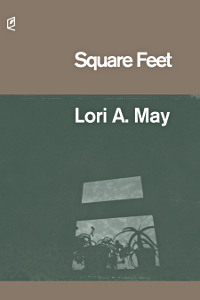
Accents Publishing
65 pages, $12
Review by Brian Fanelli
After having met editor, essayist, book reviewer, lecturer and poet Lori A. May during my M.F.A. work at Wilkes University, I wondered how she managed to balance a successful writing life with her travels, which include year-round trips in various cities to guest lecture or teach workshops. So, when I learned of her new full-length book of poems, Square Feet, I was curious if her travels would be documented in the book. Instead of writing about life on the road, however, May’s latest collection is grounded in one particular place, the domestic home. Shifting from first to third person, and relying mostly on short narrative and lyric poems, May’s work hones in on a married couple and their struggles in maintaining a happy marriage.
The book opens with a few third-person poems that introduce readers to the wife and husband, specifically their desire to keep a good home and find happiness in the myths of the American Dream. In the opening poem, “Place Settings,” for instance, the reader learns how the wedding gifts gather dust, saved for “special occasions,” while the wife imagines celebrations, but “rarely cares to entertain.” Yet, she imagines meeting the right couple that will appreciate such fancy chinaware. The small details make the poem engaging, specifically the lines about the saucer cups sitting pretty, unused, which makes the reader question why the couple keeps all of the fancy silverware if it serves no purpose other than decoration.
The poem “Tuesday A.M.” somewhat echoes the book’s opening poem in the sense that it focuses on the wife’s desire to find happiness and self-protection through consumerism. The poem opens:
Looking to buy some happiness
maybe a dose of self-respect
she combs her fingers through the racks,
sale or otherwise,
knowing the possibility is there.
If only she could find it.
The one thing to guarantee bliss,
carry her weight
for the rest of the day.
Yet, throughout the poem, the wife doesn’t quite find what she’s looking for, no chance of renewal or happiness, no dose of self-respect. She may think it’s there, but she can’t find it. Like the other opening poems, “Tuesday A.M.” gives insight into the wife’s psyche and shows that even in a relationship or house that seems ideal, there are cracks beneath the surface.
Other poems, including a series entitled “Coping Mechanism,” deal with the couple’s ups and downs, including the loss of a child, dead before birth, and the grief that ensues. However, throughout the book, there is a sense of optimism, a spring to follow harsh winters. May even uses garden imagery at times to represent rebirth after loss, including in the poem “In Memoriam,” which is punctuated with the closing image of the couple planting seeds back into the Earth’s soil as a form of hope after loss.
There is a sense too by the book’s close that despite the struggles, the couple’s love and marriage will endure. One of the final poems in the collection, “(Re)Genesis” bounces back and forth between the “he” and her” and the way they still show affection for each other. In a mere nine lines, May gives the reader the sense that everything will be OK in the couple’s domestic life.
he offers a bouquet of blossoms
speaks sweet somethings
about tomorrow and today
his focus has never been
more intent with promise
a soothing voice to mirror
her in his crisp white button-down
a flinch of grin confessing
comfort in their endurance
May does a fine job building the story of a married couple throughout Square Feet, and she keeps the subject matter interesting by shifting the point of view, alternating between husband and wife, and bringing in other characters at times, such as friends and in-laws. The forms in the book are tight for the most part, including a few haikus, which can make the domestic space feel that much more enclosed and trapping, but May has a few narrative poems that stretch out and really allow the reader into the couple’s psyches. For someone constantly on the road, the poet clearly can write about a specific space/place and ground these poems in the everyday.
***
Brian Fanelli’s poetry has been twice nominated for a Pushcart Prize and published by The Los Angeles Times, World Literature Today, Blue Collar Review, Main Street Rag, North Chicago Review, and other publications. He is the author of the chapbook Front Man (Big Table Publishing) and the full-length collection All That Remains (Unbound Content), which was nominated for the Tillie Olsen Creative Writing Award. Brian teaches English full-time at Lackawanna College, while completing his Ph.D. at SUNY Binghamton.
![[PANK]](https://pankmagazine.com/wp-content/themes/pank/assets/images/pank-logo-large.png)
